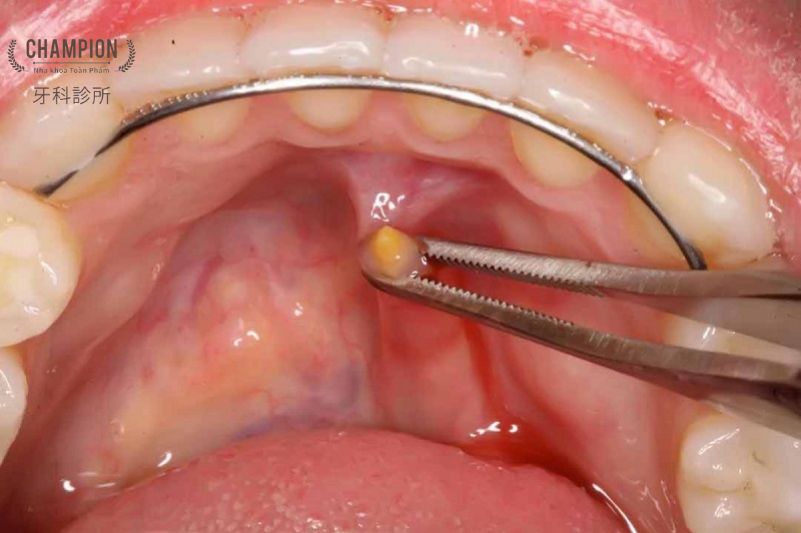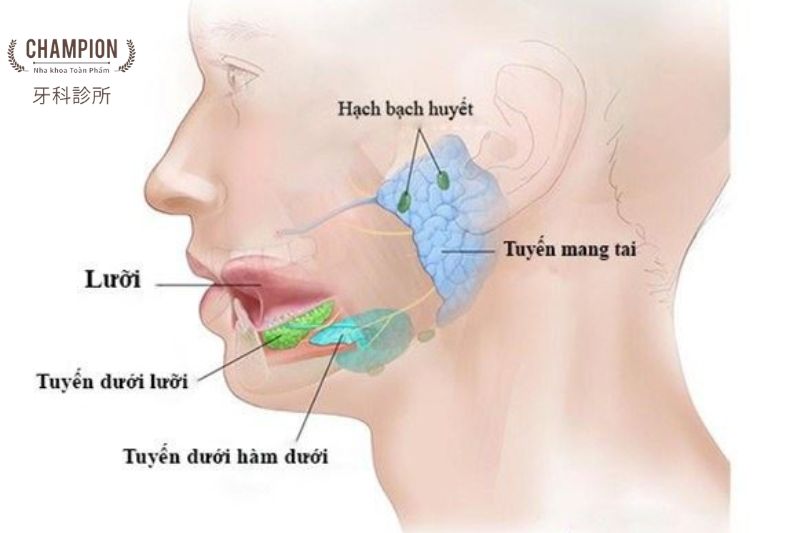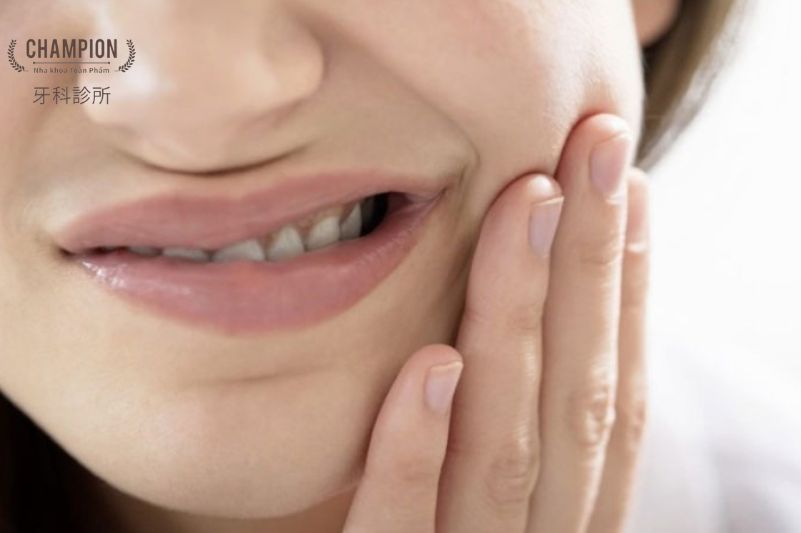Calcification of the salivary glands is a condition that haunts many people due to its sudden onset and complex progression. When calcified stones invade and block the salivary glands, you will face intense stabbing pains every time you eat or drink. Moreover, if you ignore the warning signs from your body, the consequences of this disease can be extremely dangerous.
So what are the causes, symptoms and treatments for calcification of the salivary glands? Let’s find out right below!
What is Calcification of the Salivary Glands?
Calcification of the salivary glands is the condition of formation and accumulation of calcium crystals (also called calcified stones) inside the salivary glands of the body. This is considered one of the leading causes of oral diseases.
Specifically, when calcified stones begin to form and grow larger in the salivary glands, they will cause pressure, compress tissues and block and impair the function of saliva secretion from the glands. This makes the amount of saliva secreted less or changes into thick, viscous fluid that causes discomfort. Lack of saliva in the oral cavity will allow bacteria to easily develop, causing bad breath, and the teeth are more likely to decay due to lack of ions that help mineralize tooth enamel.
In addition, large stones can damage and ulcerate glandular tissues leading to infection. Calcium stones also cause patients to suffer severe stabbing pains every time they eat or drink. Prolonged inflammation also poses the risk of leading to salivary gland cancer if not treated in time.
When signs of the disease appear such as dry mouth, sore throat when swallowing, changes in taste... patients need to quickly go to specialized medical facilities for examination and appropriate treatment. Treating salivary gland stones early will help prevent dangerous complications and protect long-term oral health.

Early Warning Symptoms of Salivary Gland Calcification
Calcification of the salivary glands is a condition that develops silently, however patients will experience early warning signs to detect this condition. Below are some common symptoms:
Dry Mouth and Thirst
When the salivary glands are blocked, the ability to secrete saliva decreases, causing a dry, uncomfortable feeling in the mouth. Patients frequently feel thirsty and need to drink water continuously.
Difficulty Swallowing and Sore Throat
Large stones can compress and damage the throat, making patients feel difficulty and pain every time they swallow.
Swollen and Painful Salivary Glands
When stones invade and infect the salivary glands, patients will feel the glands become swollen and painful, especially when eating.
Taste Disturbances
Calcium stones disrupt saliva secretion, so the tongue can no longer fully sense normal savory tastes. Patients feel their sense of taste decreases or changes.
Bad Breath
Due to less saliva, bacteria can easily develop causing uncomfortable bad breath. Some cases even experience thick, foul-smelling drool.
If the condition becomes more severe, patients may experience whole-body symptoms like high fever, headache, fatigue, loss of appetite, weight loss... These are all dangerous signs that need attention.
When any abnormal symptom from the mouth and throat appears, you need to see a doctor for examination and timely treatment. This will help prevent the disease from worsening and avoid unfortunate complications.

Causes of Salivary Gland Calcification
Salivary gland calcification is a complex syndrome that can originate from various different causes. To better understand this disease, we need to explore the factors that may contribute to the calcium stone condition.
Hormonal Changes in Females
Firstly, for females, hormonal changes are one of the leading causes. Specifically, when entering menopause, the dramatic drop in estrogen makes the bones weaker and more prone to osteoporosis. Calcium released from the bones will flow into the blood, raising blood calcium levels, thereby forming calcium stones.
Thyroid Dysfunction
Secondly, thyroid disorders like hyperthyroidism and hypothyroidism also greatly affect the body’s calcium regulation process. When overactive or inefficient, the thyroid will disrupt calcium metabolism and excretion, thus forming salivary gland stones.
Vitamin and Mineral Deficiencies
Additionally, nutritional deficiencies or excesses of vitamins A, D also contribute to increasing disease risk. Vitamins help balance calcium and minerals in the body. Thus, lacking these vitamins, calcium tends to precipitate into stones.
Other Factors
Apart from the above factors, age, smoking, prolonged stress, and environmental pollution are also risk factors that cannot be overlooked for salivary gland calcification.
The causes are very complex and diverse. Patients need thorough examination and consultation to accurately determine the cause, thereby having appropriate treatment regimens.

>> See more: Tooth Erosion Due To Bad Breath: How To Protect Your Teeth From Acid Damage
Serious Consequences of Not Treating Salivary Gland Calcification
If not detected and intervened in time, salivary gland calcification can lead to extremely dangerous consequences, even threatening patient’s lives.
Complete Salivary Gland Obstruction
As the calcified masses grow larger, they will put pressure on the gland walls, leading to complete blockade of salivary flow. At this point, the salivary glands will stop functioning, no longer able to secrete saliva to perform its functions.
Life-Threatening Complications
With complete salivary gland obstruction, the risks of dangerous complications like infections, ulcers, even salivary gland cancer will significantly rise. These are all life-threatening conditions if there is no timely medical intervention.
Impaired Eating Ability
Large stones can also damage and ulcerate the throat lining, making it difficult and painful for patients to eat and swallow. The consequence is the body becomes malnourished, weakened, and prone to illness.
Therefore, upon detecting the disease, patients need to promptly receive treatment to eliminate the stones, avoiding unfortunate complications. Protecting health and life is the top priority.

Advanced and Effective Treatment Methods for Salivary Gland Calcification at Champion Dental Clinic
With experienced doctors and modern medical equipment, Champion Dental Clinic has adopted and is still using the most advanced and effective treatment methods for salivary gland calcification.
Modern Endoscopy Technique
With salivary gland endoscopy, doctors can easily observe directly the stones inside the glands, thereby providing accurate treatment plans. Simultaneously, this technique guarantees safety, minimal invasion, and no pain for patients.
Modern Laser Usage
Laser is used to deactivate stone fragments before specialized tools are used to easily and quickly remove them from the glands. This method allows comprehensive stone elimination without damaging the glands.
Post-Operative Medications
After stone removal, doctors will prescribe antibiotics, painkillers and anti-inflammatory drugs to control infection and prevent recurrence. Patients will be advised on medication usage to achieve optimal treatment results.
With the professional treatment procedure above, Champion Dental Clinic is committed to delivering the best possible treatment results for patients, eliminating disease relapse risks once and for all.
Conclusion:
Salivary gland calcification is a hazardous condition unless treated promptly and properly. However, with advancements in modern medicine, the disease can absolutely be cured successfully if you access the correct methods.
We understand that oral health is always a top priority concern. Therefore, Champion Dental Clinic is committed to providing salivary gland calcification treatment services with modern equipment and a skilled, dedicated team of dentists.
Contact us today for a free consultation and appointment booking. We are always ready to accompany you on the journey to conquer the most beautiful confident smile.
Vietnamese & English: (028) 5411-2295
中文: (028) 5411-2297 172 Nguyen Luong Bang, Tan Phu Ward, District 7, Ho Chi Minh City.
Fanpage: Champion Dental Clinic 牙科診所
Zalo: Champion Dental Clinic
Youtube: Champion Dental Clinic 牙科診所
 Champion Dental Clinic
Champion Dental Clinic



